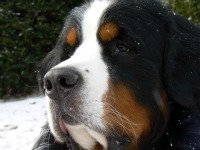Malignant Histiocytosis - Counting Copies
Cancer is what happens when normal cells start growing out of control. Malignant histiocytosis and other histiocytic cancers are caused by problems with the two types of histiocytes found in the body. These cells, dendritic cells and macrophages, are the scavengers of the immune system. Their job is to identify and engulf foreign substances to protect against infection. When things go wrong with them, they tend to go very wrong.
 Although cancers involving histiocytes are rare, in both humans and most dogs, when these cancers occur, they tend to be deadly. Unfortunately, several dog breeds seem to be at particularly high risk of these cancers – including Bernese Mountain Dogs and Flat-Coated Retrievers – and affected dogs often survive for only a few months after diagnosis.
Although cancers involving histiocytes are rare, in both humans and most dogs, when these cancers occur, they tend to be deadly. Unfortunately, several dog breeds seem to be at particularly high risk of these cancers – including Bernese Mountain Dogs and Flat-Coated Retrievers – and affected dogs often survive for only a few months after diagnosis.
Histiocytic cancers make up a quarter of all tumors seen in Bernese Mountain Dogs and a whopping 40 percent of tumors seen in Flat Coated Retrievers – making them serious health problems for the breeds. However, the frightening frequency with which these tumors occur also opens up a unique and powerful opportunity to study their cause. Investigating the genetic similarities between families of affected dogs could be a way to help scientists to understand what physical changes predispose animals and people to these rare cancers and, hopefully, eventually lead to a treatment or cure.
With the help of funding from the American Kennel Club Canine Health Foundation, scientists from North Carolina State University have started to tease out some of those answers. By looking for DNA copy number aberrations in dogs with these cancers – genes that express abnormally few or far too many copies – they have begun to identify some of the genetic factors that may be putting dogs, and people, at risk.
Tumor suppressor genes, when present and functional, are responsible for telling cells when to stop dividing. That’s how they got their name – they prevent the uncontrolled cell growth associated with cancerous tumors. Deletions or other mutations in various tumor suppressor genes have been associated with a large number of human and animal cancers, and this new research supports the idea that the same may be true for histiocytic cancers as well.
In both Bernese Mountain Dogs and Flat Coated Retrievers, histiocytic sarcomas were found to be associated with deletions in three tumor suppressor genes – CDKN2A/B, RB1 and PTEN – genes in which problems have also been tentatively reported for human histiocytic cancers. Furthermore, the fact that similar copy number aberrations were seen in both breeds strongly suggests that the changes were directly related to the formation of the histiocytic cancers rather than simply characteristics of the breeds.
There were, however, some variations. Although both Bernese Mountain Dogs and Flat Coated Retrievers frequently develop histiocytic cancers, they do so in different places. Bernese Mountain Dogs tend to develop cancers in one or more of their internal organ systems while Flat Coated Retrievers grow tumors in their bones or joints. That’s why the scientists were so interested to discover that, while most of the copy number aberrations seen in dogs suffering from histiocytic cancers were found in both breeds, there were some changes specific to each breed. The researchers hope that perhaps those breed-specific changes will help to explain why the cancers behave differently in the two types of dogs, and they have plans to investigate further by extending their investigation into other breeds of dogs who are also susceptible to histiocytic cancers.
Hopefully research like this, which increases our understanding of these deadly cancers, will one day lead to improvements in the lives of humans and animals alike.
This work was funded by AKC Canine Health Foundation Grant 760.
Scientific Publication:
Help Future Generations of Dogs
Participate in canine health research by providing samples or by enrolling in a clinical trial. Samples are needed from healthy dogs and dogs affected by specific diseases.



